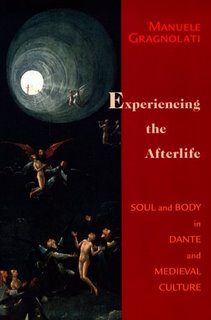
Manuele Gragnolati's book Experiencing the Afterlife: Soul and Body in Dante and Medieval Culture is the seventh volume in 'The William and Katherine Devers Series in Dante Studies' published by the University of Notre Dame Press. It is an extremely interesting read and comes highly highly recommended. Based on the author's Ph.D. thesis at Columbia (1999, sup. Barolini), the book looks at concepts of pain and suffering in the thirteenth century and how these were incorporated into the notion of Purgatory by Dante. Exactly how do the damned in Hell, and the souls in Purgatory suffer and how does corporeality (and lack therof) affect this suffering? G. looks at Bonvesin de la Riva's Book of the Three Scriptures and argues that the second Red Scripture provides a conceptual model of experiencing the suffering of the Passion that is analogous to the kind of experiencing of suffering the souls undergo in Purgatory. He also argues that Dante's embryological theories, outlined by Statius in Purg. 25 is a (poetic) sythesis of competing theoretical positions on the formation of the soul, form plurality of forms (Bonaventure, Bacon et al.) to unicity (Albert, Thomas, et al.). He asserts that Dante 'plays with the ambiguity within unicity of form's understanding of the soul, but also that he vacilates between the principles of unicity and plurality, arriving at his own original position on personhood, which allows for the perseverance of identity in the afterlife and at the same time maintains the significance of the body materiality' (p. 87). These are important points and provide important philosophical and theological reasons for why the body's materiality is so interesting in the Comedy. G. argues in addition that, in consonance with much Northern Italian eschological writings, the resurrection of the body was seen as a fundamental part of death, that everything that happens after one dies is merely a process until the soul is reunited with the body on the Day of Judgment. These are powerful considering when reading Dante's experience of the afterlife, for he is experiencing it as no-one else is, both in body and soul.
There is much more to say about this book, such as the re-focussing on those aspects of Dante that are indebted to rich veins of popular medieval culture, largely ignored by the critics who sought to place him in a highly Scholastic and learned tradition. This is a very enjoyable book, it is clear, concise, and argued with assurance.
The book has also got me thinking about Eleonore Stump's lectures here in Schools on Evil and Suffering, on the different kinds of pain, on the evil of suffering (or not), and Thomas Aquinas' definition of love.
There is much more to say about this book, such as the re-focussing on those aspects of Dante that are indebted to rich veins of popular medieval culture, largely ignored by the critics who sought to place him in a highly Scholastic and learned tradition. This is a very enjoyable book, it is clear, concise, and argued with assurance.
The book has also got me thinking about Eleonore Stump's lectures here in Schools on Evil and Suffering, on the different kinds of pain, on the evil of suffering (or not), and Thomas Aquinas' definition of love.
No comments:
Post a Comment